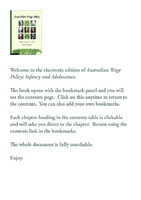Australian Wage Policy: Infancy and Adolescence
Abstract
The advent of industrial regulation by tribunal came close to the turn of the century. Wages boards began in Victoria in 1896 and courts of arbitration in 1900. The first day of the new century was also the first day of the Commonwealth of Australia, endowed with a Parliament that was empowered to institute its chosen models of conciliation and arbitration for the prevention and settlement of interstate industrial disputes.
This book is a study of the operation of conciliation and arbitration, especially by the Commonwealth Court of Conciliation and Arbitration, from the inception of the system until World War II. It is not, however, a general history of conciliation and arbitration.
It does not, for example, deal with the successes and failures of the tribunals in preventing strikes and lockouts; or with the manifold legal issues to which the system gave rise, unless they affected significantly the tribunals’ exercise of their power to fix wages and conditions.
Rather, it is about fixing the terms of employment; and it attempts to set the tribunals’ performance in an economic context. It is about ‘wage policy’, if the term is interpreted broadly enough to include both prescribed wages and other factors that affect the cost of labour, including working hours and leave.
Keywords
basic wage; harvester case; wage regulation; depression; keith hancock; wage critique; wage policy; Australia; Beeby; Cost of living; Living wage; Real wages; UnemploymentDOI
10.20851/wage-policyPublisher
University of Adelaide PressPublisher website
https://www.adelaide.edu.au/press/Publication date and place
2013Classification
Economic history


 Download
Download Web Shop
Web Shop